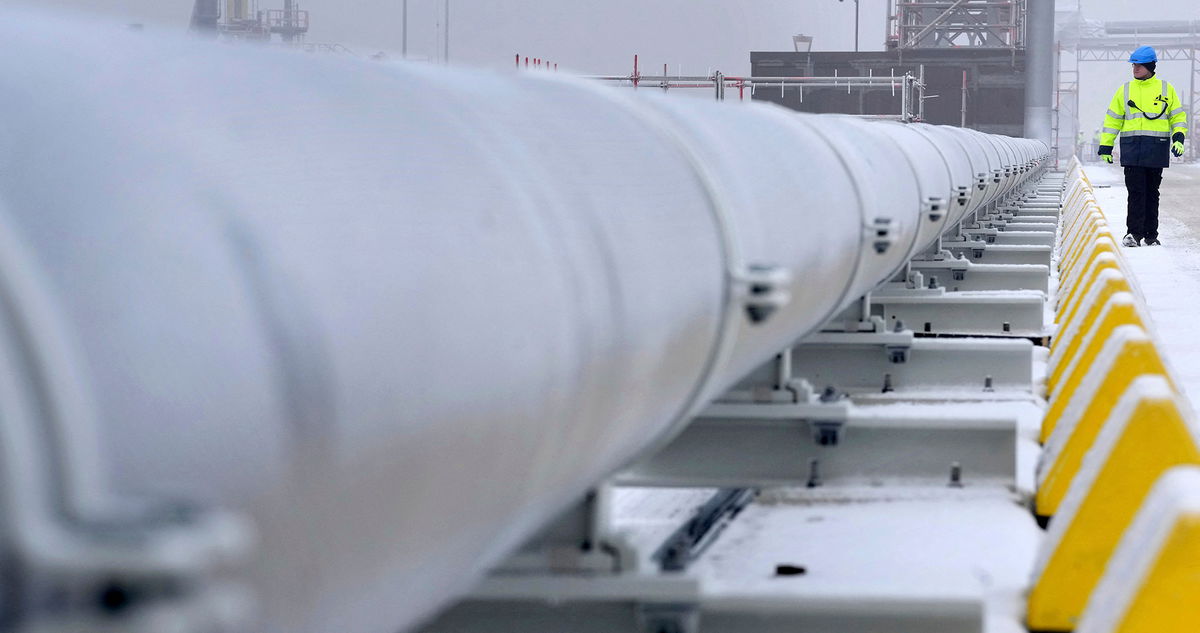Europe finally agrees to cap gas prices

A worker walks past gas pipes in Wilhelmshaven
By Anna Cooban and Hanna Ziady, CNN
Europe has agreed to a cap on natural gas prices, following months of debate over whether the measure will protect European households and businesses from extreme price spikes as temperatures plummet.
In a Monday meeting, EU energy ministers agreed to trigger a cap if the price of month-ahead natural gas futures contracts on the Dutch Title Transfer Facility (TTF) — the bloc’s benchmark gas exchange — exceed €180 ($191) per megawatt hour for more than three consecutive working days.
The month-ahead TTF price must also be €35 ($37) higher than a reference price for liquified natural gas (LNG) for the same period for the cap to be activated. Prices for LNG — a chilled, liquid form of gas that can be transported via sea tankers — are tightly linked to prices for Europe’s natural gas delivered by pipelines.
The cap will apply to gas contracts traded on all European trading hubs for supplies one month, three months and a year ahead. Once triggered, prices that are €35 above a reference price for LNG, based on transactions on global markets, will not be permitted. The cap can be triggered as of February 15 next year.
“We have the deal,” Jozef Síkela, deputy prime minister for the Czech Republic, said at a Monday press conference. The Czech Republic currently holds the presidency for the EU Council.
The price ceiling is much lower than the €275 ($292) per megawatt hour limit originally proposed by the European Commission last month.
Síkela described the cap as a “temporary, effective [and] realistic mechanism which will protect citizens and businesses from the excessive gas prices we have seen this summer.”
“This is not a fixed cap, but rather a dynamic one,” he added.
The cap is the latest in a raft of measures agreed by the European Union this year to stem an energy crisis sparked by Russia’s invasion of Ukraine that has pushed up prices and fueled the highest inflation in decades.
Gas prices spiked to a record high of around €345 ($367) per megawatt hour in August, after Moscow reduced gas deliveries to the continent. TTF gas futures fell back 5% on Monday to hit €107 ($114) per megawatt hour.
Other EU measures have included gas storage requirements and a price cap of $60 a barrel on seaborne Russian oil.
Concerns linger
Despite Monday’s political agreement, analysts and traders remain concerned that the mechanism could backfire –— causing prices to rise and worsening potential supply shocks.
Germany, the bloc’s biggest economy and one of its largest importers of natural gas, had been the most notable holdout before Monday’s announcement.
“Gas traders would likely liquidate short positions and stop selling futures if they fear the break could be activated imminently, for fear of the resulting losses,” analysts at Eurasia Group said in a Monday note.
Following the announcement, a spokesperson for the Intercontinental Exchange, which operates the TTF, said that it had “consistently voiced our concerns about the destabilizing impact a [price cap] will have on the market.”
The spokesperson said the exchange was reviewing the details of the new proposal and “whether [it could] continue to operate fair and orderly markets for TTF from the Netherlands.”
Trading on the TTF will continue to operate as usual for the foreseeable future, they added.
In light of concerns, Síkela said that the cap could be “automatically deactivated” in several instances, including when gas consumption across the bloc is high, if trading on the TTF declines, or if quarterly imports of LNG fall.
The proposal still requires a “qualified majority” to be implemented, meaning that 15 countries representing at least 65% of Europe’s population must agree to it.
The-CNN-Wire
™ & © 2022 Cable News Network, Inc., a Warner Bros. Discovery Company. All rights reserved.